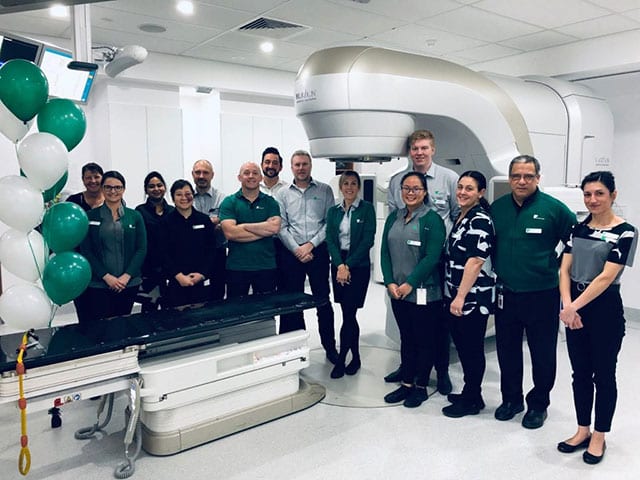- Patients
- Conditions
- Cancer conditions
- Pancreatic cancer
Introduction
Pancreatic cancer treatment and diagnosis
Pancreatic cancer
Our teams of cancer specialists are experienced in several different treatments and the latest technologies to treat pancreatic cancer that are proven to be effective. They will work together to ensure that you receive the best possible care from diagnosis through to treatment and survivorship.

Diagnostics
Chapter 1
Diagnostics
Pancreatic cancer is often diagnosed with imaging scans, such as MRI and CT, and pathology tests such as blood tests and biopsy, although your doctor may use other tests to identify the problem. You may also have other advanced tests to find out more about your cancer, where it’s located and which treatments are likely to be most effective. Some of these tests are also used to assess how well your treatment is working.
Find your nearest GenesisCare center to find out what diagnostic tests and scans are available in your local area. Whatever your outcome, our expert team will support you throughout your treatment journey.
We offer treatments that can effectively improve pancreatic cancer prognosis, manage the disease and help minimize any discomfort and pain. These include surgery, ablation, embolization, chemotherapy, targeted therapy and radiation therapy. Determining the most appropriate treatment for your situation depends on the type of pancreatic cancer you have, its stage and location. You and your physician will work together to decide on the most appropriate treatment plan for you, tailored to your needs.
Contact us to learn more
Surgery
Chapter 2
Surgery
We work with expert teams of surgeons who are specially trained in surgical removal of tumors in the pancreas.
When diagnosed early, surgical removal of the tumor can slow growth and control the disease and, in very early cases, potentially cure it. One of several different surgical techniques may be chosen, ranging from partial to full removal of the pancreas. The most common procedure for cancers confined to the head of the pancreas is the Whipple procedure where the tumor is removed and the pancreas is reconnected to your digestive system. Your surgeon typically also removes parts of the duodenum, gallbladder, common bile duct and part of the stomach. The lymph nodes and spleen may also be removed.
Surgery can also be performed to remove tumors in other parts of the pancreas, to remove the whole pancreas, or, in some advanced disease cases, to remove and reconstruct nearby blood vessels that are affected by a tumor.
Ablation
Chapter 3
Ablation
Ablation is not often used for pancreatic tumors, but if the cancer has spread to other sites, such as the liver, ablation of those tumors may be an option.
With image-guided ablation therapy, your clinician uses an imaging technology such as a CT scan or MRI to guide the ablation technology to the tumor site. Ablation technology includes:
- Cryotherapy – using extreme cold to freeze and destroy the tumor
- Radiofrequency – using high-energy radio waves to heat and destroy the tumor
- Laser or microwave therapy – to heat and destroy the tumor
Embolization
Chapter 4
Embolization
Arterial embolization can be used for patients who are not candidates for surgery or ablation for pancreatic cancer that has spread to the liver. Embolization therapy uses tiny particles to block the flow of blood to tumors through the artery feeding them. This destroys the cancer cells by starving them of oxygen and nutrients. In some cases, the particles may be radioactive (radioembolization) or infused with chemotherapy (chemoembolization), providing the added power of a dual-acting therapy.
Medical oncology
Chapter 5
Medical oncology
At GenesisCare, we offer various drug therapies and a wide range of the latest anti-cancer drugs for ovarian cancer treatment, including hormone therapy, chemotherapy and targeted therapy.
Hormone therapy
Many ovarian tumors need the hormone estrogen to grow. Hormone therapy for ovarian cancer works by blocking estrogen from binding to the cancer cells, or preventing your body from producing estrogen, which slows down their growth. Common types of hormone therapy for ovarian cancers are:
- LHRH agonists – stop your ovaries from producing estrogen
- Tamoxifen – stop estrogen from stimulating cancer growth
- Aromatase inhibitors – blocks hormones from turning into estrogen in post-menopausal women
Chemotherapy for ovarian cancer
Chemotherapy refers to drugs that destroy cancer cells. Our expert teams may recommend chemotherapy before or after other treatments, or on its own. The type of chemotherapy you’ll receive will also depend on your how advanced your ovarian cancer is. If you have cancer that has spread to other parts of your body, chemotherapy can help control its growth, relieve symptoms and improve your ovarian cancer prognosis.
Targeted therapy for ovarian cancer
As researchers know more about ovarian cancer, they have developed new treatments that can specifically target it. We use targeted therapy to seek and attack cellular activity that the cancer depends on to survive and grow. They are used depending on the specific genetic make up of your cancer. Types of targeted therapy for ovarian cancer include:
- PARP inhibitors – suitable for certain ovarian cancers, by blocking the DNA repair pathway in cancer cells often leading to cell death
- Angiogenesis inhibitors – appropriate for some ovarian cancers, work by blocking the protein VEGF which promotes new blood vessel formation and helps tumors grow
- NTRK inhibitors – a small number of ovarian cancers have changes in a gene called NTRK which can lead to abnormal cell growth and cancer. These drugs are used for advanced ovarian cancer to target proteins made by these genes
Radiation therapy
Chapter 6
Radiation therapy
At GenesisCare we specialize in advanced radiation therapy techniques that are designed to be effective and minimize the side effects you’ll experience. As the largest radiation oncology provider in the U.S. and a global leader in cancer care, our broad experience and world-class expertise means we offer advanced and innovative radiotherapy as standard.
Our latest-generation machines are built to deliver highly targeted radiation beams. The accuracy of these treatments, together with the expertise of our teams, helps our patients achieve the best possible outcomes.
The type of pancreatic cancer treatment your radiation oncologist recommends will depend on your diagnosis, if the cancer has spread to other parts of your body, your general health and personal preferences.
Intensity-modulated radiation therapy (IMRT)
IMRT is an advanced external beam radiation therapy technique where the beams of radiation are precisely shaped to exactly match your tumor and damage to adjacent healthy tissues is limited.
Surface-guided radiation therapy
SGRT uses sophisticated 3D camera technology to help your radiation therapy care team to position you for treatment more accurately each day, without the need for permanent tattoos. The technology also monitors any unintended movements to might make during the treatment and will pause the radiation until you are back in the correct position.
Volumetric modulated arc therapy (VMAT)
VMAT is an advanced form of IMRT that directs beams of radiation in an arc across the treatment area. Together with surface-guided radiation therapy (SGRT), it’s possible to very accurately target areas of cancer, adjusting the beam and intensity of radiation dose to allow for movements in the body and avoid tissues nearby.
Find a physician
Find a specialist in our network
Why choose GenesisCare
Why choose GenesisCare?
GenesisCare U.S. offers community-based cancer care and other services at convenient locations. The company’s purpose is to redefine the care experience by improving patient outcomes, access and care delivery. With advanced technology and innovative treatment options, skilled physicians and support staff offer comprehensive and coordinated care in radiation oncology, medical oncology, hematology, urology, diagnostics and surgical oncology.
Read next

Who we are
With over 100 centers across Florida, we offer the latest treatments and technologies that have been proven to help patients achieve the best possible outcomes.

Working with us
Join a company with the mission to personalize cancer care and improve patient outcomes.

News room - What's been happening
From new centers and technologies to the latest innovations in care, stay on top of what we are doing

